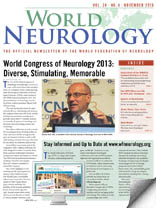WFN COUNCIL OF DELEGATES REPORT
Almost 80 Delegates and representatives assembled in Vienna on Sept. 22 for the Annual General Meeting of the Council of Delegates. They arrived for registration to be greeted by a colorful oriental display from the three cities bidding to host the 2017 World Congress of Neurology — Hong Kong, Kyoto and Seoul. The importance of the occasion was evident to everyone, even more so because, in addition to the selection of the WCN 2017 venue, Delegates chose three new officers and one new elected trustee.
As well as presentations from the three member societies, Delegates heard an assessment from the Federation’s Professional Congress Organizer (PCO) and received reports from members of the site visit team to help them make up their minds. It was a difficult choice but eventually Kyoto won the day.
Just as keenly contested were the elections for officers and trustee, where 11 highly qualified candidates from across the globe stood for president, first vice president, secretary-treasurer general and elected trustee. All of them addressed the assembly to present their vision and goals if elected. Ballot papers were collected and counted outside the meeting by Keith Newton, WFN executive director, with assistance from Tanja Weinhart, Austrian Society executive secretary, under the close supervision of Professor Johan Aarli, WFN past president and Professor Marianne de Visser, EFNS vice president. At the conclusion of the meeting, the results were announced.
- WFN President: Raad Shakir (UK)
- WFN First Vice President: William Carroll (Australia)
- WFN Secretary-Treasurer General: Wolfgang Grisold (Austria)
- WFN Elected Trustee: Amadou Gallo Diop (Senegal)
Delegates also received reports from officers and committee chairs, including chairs and co-chairs of the Education and Applied Research Committees. The former gave a PowerPoint presentation of the activities of the Education Committee, including the development of standard operating procedures for committee activities, such as the monitoring of educational grants; departmental visit programs; and teaching center accreditation. Donna Bergen, chair of the Applied Research Committee, reported that new Applied Research Groups have been established on coma, neuro-oncology and neuro-infectious diseases.
The Membership Committee proposed a category of Pending Membership to speed up the process of assimilating new societies into the Federation. Only voting rights will be temporarily withheld until all formalities are completed. This year, three new societies joined the WFN — Oman, Tanzania and Uzbekistan — bringing the total number of neurological associations in the organization to 117.
Regional initiatives in Africa, Asia and Latin America have already begun to lay the foundations for the future and look set to build on them under the next administration now that Shakir has promised “global involvement through regional empowerment.”
By common consent, the Vienna Congress was a resounding success. Planning for Chile 2015 has already begun; Kyoto is our destination in 2017; and members are now urged to think ahead to 2019, when we return to the region of Africa or the Middle East for our biennial World Congress of Neurology.
